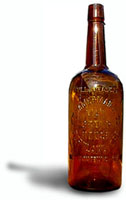A Smuggler's Paradise
Up until the mid-nineteenth century, Grand
Bahama Island had largely been left alone by the outside world. There were
plenty of sails on the horizon as ships came and went through the Caribbean,
but more often than not they passed by. Records from 1836 show that the
population of West End numbered only about 370,
many of whom abandoned the island for the greater opportunities in
Nassau. In 1861, however, the flow of people reversed direction, and population
of the town virtually doubled overnight. The reason was the American Civil
War.
At the outbreak of the war, The Confederacy of Southern States, a mere
55 miles away, immediately fell under a strict Union blockade and embargo.
Getting goods such as sugar, cotton, and weapons in and out of the Confederacy
was essential to the war effort, and smugglers operating out of West End
were able to command hefty prices from the South. As soon as the war ended,
however, so did the boom, but the short burst of prosperity set an important
precedent: from then on, the history of Grand Bahama Island was intimately
tied to that of the United States.
The next smuggling boom came from a much different (and much more sought
after) banned good in the US: alcohol. If the residents of West End had
known that the 14th Amendment would bring unheard of  prosperity
to their village, they probably would have lobbied for it themselves. Prohibition
brought warehouses, distilleries, bars, supply stores, and inns to West
End. The town's smugglers had the system down to a science. They'd sail
off at night, with ropes dragging huge cylinders of liquor behind them.
If the American Coast Guard pursued, they would simply cut the ropes, wait
for the patrol to leave, then recover them. Just as it was during the Civil
War, however, as soon the US solved its problem, the economy dove and people
started fishing again. It was only with the rise
of tourism that the fickleness of the economy would change for good.
prosperity
to their village, they probably would have lobbied for it themselves. Prohibition
brought warehouses, distilleries, bars, supply stores, and inns to West
End. The town's smugglers had the system down to a science. They'd sail
off at night, with ropes dragging huge cylinders of liquor behind them.
If the American Coast Guard pursued, they would simply cut the ropes, wait
for the patrol to leave, then recover them. Just as it was during the Civil
War, however, as soon the US solved its problem, the economy dove and people
started fishing again. It was only with the rise
of tourism that the fickleness of the economy would change for good.
HOME | THE ISLAND | NATURE
| HISTORY | PEOPLE | WHAT
TO DO |
|
This
page, and all contents of this Web site are Copyright |
|